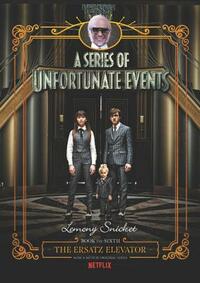You need to sign in or sign up before continuing.
Take a photo of a barcode or cover
adventurous
mysterious
fast-paced
dark
mysterious
tense
fast-paced
Plot or Character Driven:
Plot
Strong character development:
No
Loveable characters:
Yes
Diverse cast of characters:
No
Flaws of characters a main focus:
No
Minor: Child abuse, Kidnapping
adventurous
challenging
dark
emotional
funny
fast-paced
I really like how the trope is expanding but Akzo more of the bigger picture comes into play in this one.
I really used to like this series. I read the first three in 2004? 2005? They were cute and wonderfully dismal. But then the 4th one was the same and the 5th one was the same and the sixth was the same. A word that here means: Fuck off.
I gave up after reading the fifth one in 2012. Granted, I was going through a major depressive episode and wondered if I was the reason I couldn't enjoy it.
So I picked this up now, 5 years later.
The repetition would be bad on its own but probably bearable. After all, this is a series for children, but then comes the insane amount of absurd fuckery in these books.
I have no issue believing absurd shit--I love fantasy and I get that the style of it is like this on purpose but I don't like that kind of hyperbole or how it keeps using the same words over and over again--I want to read a book not to have a vocabulary lesson. I assume it's probably worse because it's on audiobook, a real pity since not even Tim Curry could save this from being a horrible experience.
I love the premise--I do; the heroes don't always win and there are bad people in the world thaty have their way etc but SERIOUSLY everyone on the reviews is like "the formula works once more!!!"
THE FORMULA IS LITERALLY WRITING THE SAME BOOK OVER AND OVER AGAIN IN A DIFFERENT SETTING
This was a small audiobook of 4 hours 29 minutes and it took me three days to read it because I kept stopping.
I get the appeal to younger children, and honestly it does have good vocabulary in it but it gets stupidly annoying fast as it stops the narration to explain what words mean.
It also includes one of my biggest pet peeves: kids talking like adults
stop writing kids like adults
AND NOT EVEN GET ME STARTED ON THE BABY BITING HER WAY UP THE SHAFT
LIKE
fuck off already
Most of Sunny is silly, I mean, she was employed as a secretary and she bit down on wire to make staples by hand.
On one hand, I want to finish it to know what happens, on the other, I'll just watch the series on Netflix. Fuck off I'll go read something worthy of my time.
I gave up after reading the fifth one in 2012. Granted, I was going through a major depressive episode and wondered if I was the reason I couldn't enjoy it.
So I picked this up now, 5 years later.
The repetition would be bad on its own but probably bearable. After all, this is a series for children, but then comes the insane amount of absurd fuckery in these books.
I have no issue believing absurd shit--I love fantasy and I get that the style of it is like this on purpose but I don't like that kind of hyperbole or how it keeps using the same words over and over again--I want to read a book not to have a vocabulary lesson. I assume it's probably worse because it's on audiobook, a real pity since not even Tim Curry could save this from being a horrible experience.
I love the premise--I do; the heroes don't always win and there are bad people in the world thaty have their way etc but SERIOUSLY everyone on the reviews is like "the formula works once more!!!"
THE FORMULA IS LITERALLY WRITING THE SAME BOOK OVER AND OVER AGAIN IN A DIFFERENT SETTING
This was a small audiobook of 4 hours 29 minutes and it took me three days to read it because I kept stopping.
I get the appeal to younger children, and honestly it does have good vocabulary in it but it gets stupidly annoying fast as it stops the narration to explain what words mean.
It also includes one of my biggest pet peeves: kids talking like adults
stop writing kids like adults
AND NOT EVEN GET ME STARTED ON THE BABY BITING HER WAY UP THE SHAFT
LIKE
fuck off already
Most of Sunny is silly, I mean, she was employed as a secretary and she bit down on wire to make staples by hand.
On one hand, I want to finish it to know what happens, on the other, I'll just watch the series on Netflix. Fuck off I'll go read something worthy of my time.
This was my comeback to this series. Over 14 years ago I read the first five installments of ASoUE, and when the second season on Netflix was renewed, I knew I'd like to read the books before watching the episodes I still hadn't read, so here I am.
Over a decade ago, I remember a friend of mine saying that book six was where things really picked up in this series (which in my opinion is kind of late for a books series to pick up, but anyway) and I've read some similar reviews on Goodreads.
To be honest, this wasn't my favourite book on the series. Maybe because I'm a grown up, or maybe because I like the series better, I don't know. It had an ok pace and nice plot, and Snicket's narration is always delightful to read. One of dreams is for him to write YA or Adult novel. That'd be great.
I love the messages in this book, about fashion, neglect (which is recurring in all books, I know, but was very proeminent in my opinion with the figure of Jerome Squalor), friendship and resourcefulness. I will always appreciate this series for giving us smart, no-nonsense kids, and amazing women in Violet and Sunny Baudelaire. I love when Snicket actually refer to them as women and not girls, that's so important. So very often in media women (even fully grown ones) a referred to as "girls" o even "babies", it pisses me off. And I think one very important difference between book and series that is much more positive on the books is the fact that there's no sparks of romance between neither Baudelaires and Quagmires. Praise Snicket for this. We can actually interact with the opposite sex without any intentions other than being good friends, thank you.
As always, the book follows a very specific rhythm, established early on in the first books: quirky set-up by Snicket, the children being dropped off by incompetent Mr Poe to their new guardians home, getting to know these new guardians (usually poorly capable ones), Count Olaf arrives in disguise, nobody believes the Baudelaires, scheming and action ensues, Mr Poe comes back and no one takes their word for it until it's very too late.
I must say the addition of the Quagmires is a breath of fresh air to the series. I know this is a middle school book, so it doesn't do any good in complicating plots, but this old structure gets really tiring after the fifth time reading it. And after six times, the suspension of belief starts to falter as well -- I for one can't actually believe Mr Poe still doesn't give any credit to the children after SIX BOOKS. I think my biggest beef with these books is this: there's very little character development going to. They're all very static in what they are and their role in the story.
Again, I know this is a middle school book. I know it's not supposed to be gritty or challenging or whatever, but character development is not something that should be exclusive to YA or older. It could be done gracefully on this series, specially because the author has THIRTEEN BOOKS to do it.
The mystery also drags on for too long -- I never feel a sense of satisfaction upon finishing the books. The "mystery" piles up but there's very little sense of revelation (even small ones) about the whole thing. I guess that's another reason why I prefer the series over the books.
I'll keep reading, because the narration is priceless and the characters are engaging enough. I just hope I am able to finish it.
Over a decade ago, I remember a friend of mine saying that book six was where things really picked up in this series (which in my opinion is kind of late for a books series to pick up, but anyway) and I've read some similar reviews on Goodreads.
To be honest, this wasn't my favourite book on the series. Maybe because I'm a grown up, or maybe because I like the series better, I don't know. It had an ok pace and nice plot, and Snicket's narration is always delightful to read. One of dreams is for him to write YA or Adult novel. That'd be great.
I love the messages in this book, about fashion, neglect (which is recurring in all books, I know, but was very proeminent in my opinion with the figure of Jerome Squalor), friendship and resourcefulness. I will always appreciate this series for giving us smart, no-nonsense kids, and amazing women in Violet and Sunny Baudelaire. I love when Snicket actually refer to them as women and not girls, that's so important. So very often in media women (even fully grown ones) a referred to as "girls" o even "babies", it pisses me off. And I think one very important difference between book and series that is much more positive on the books is the fact that there's no sparks of romance between neither Baudelaires and Quagmires. Praise Snicket for this. We can actually interact with the opposite sex without any intentions other than being good friends, thank you.
As always, the book follows a very specific rhythm, established early on in the first books: quirky set-up by Snicket, the children being dropped off by incompetent Mr Poe to their new guardians home, getting to know these new guardians (usually poorly capable ones), Count Olaf arrives in disguise, nobody believes the Baudelaires, scheming and action ensues, Mr Poe comes back and no one takes their word for it until it's very too late.
I must say the addition of the Quagmires is a breath of fresh air to the series. I know this is a middle school book, so it doesn't do any good in complicating plots, but this old structure gets really tiring after the fifth time reading it. And after six times, the suspension of belief starts to falter as well -- I for one can't actually believe Mr Poe still doesn't give any credit to the children after SIX BOOKS. I think my biggest beef with these books is this: there's very little character development going to. They're all very static in what they are and their role in the story.
Again, I know this is a middle school book. I know it's not supposed to be gritty or challenging or whatever, but character development is not something that should be exclusive to YA or older. It could be done gracefully on this series, specially because the author has THIRTEEN BOOKS to do it.
The mystery also drags on for too long -- I never feel a sense of satisfaction upon finishing the books. The "mystery" piles up but there's very little sense of revelation (even small ones) about the whole thing. I guess that's another reason why I prefer the series over the books.
I'll keep reading, because the narration is priceless and the characters are engaging enough. I just hope I am able to finish it.
Another depressing, yet well written, addition to the sadistic Baudelaire saga. Poor kids... and sick, sick author (how does he keep coming up with this stuff?). But if my grandkids love these stories, who am I to judge? I have to admit Count Olaf is an inspired creation. You absolutely have to become inhuman to root for this guy. Even Darth Vader, despite being complicit in the destruction of an entire planet, could drum up a little sympathy. However, there's no sympathy for this devil. Onward to the next chapter eventually...
dark
funny
mysterious
fast-paced
Plot or Character Driven:
Plot
Strong character development:
Yes
Loveable characters:
Yes
Diverse cast of characters:
No
Flaws of characters a main focus:
No
It may be because I went into the book "blind", a word which here means I couldn't remember what happened in this book of the series, but I really enjoyed this one. I totally forgot who was assisting Count Olaf and most of the details of what happened in the plot. The guardians in this book, while one did know the Baudelaire's mother, are awful...as per usual.







